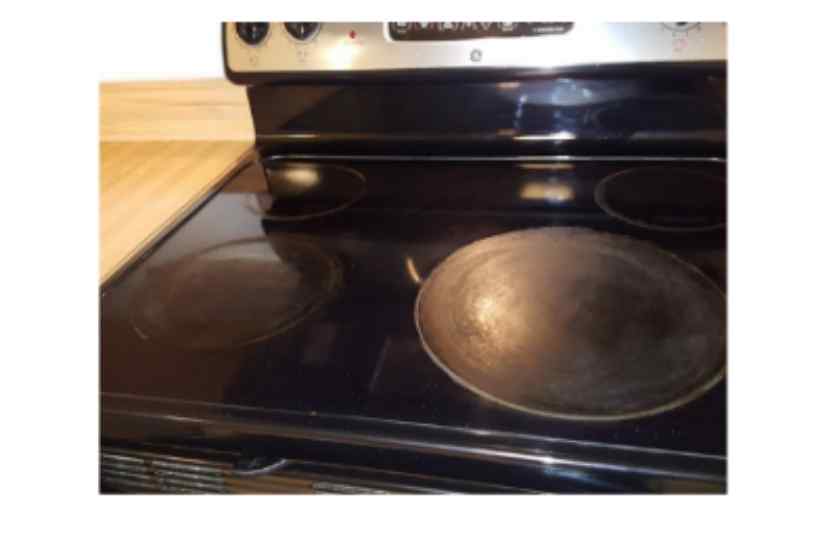Trying to decide if you should charge your tenant for damage to a glass stovetop? Not sure who is to blame. There are many things you should take into consideration but the most most important ones are the type of damage and the age of the appliance.
The damage I see most often is cracked glass and discoloration. Most of the time you will be able to tell who is responsible just by looking at the condition of the stovetop.

What causes cracked and damaged glass?
Here are the most common ways a smooth stovetop can get damaged:
- An Impact from something heavy
- Using the wrong cookware
- Overheating
- Sudden temperature changes
- Dirty stovetop
- Manufacturing defect
- Improper cleaning
Heavy iron pots and pans can do a lot of damage not only because of the danger of dropping them and cracking the glass top but also because they create scratches on the surface which can weaken the glass.
The use of certain cookware can eventually lead to cracked glass but more often than not is responsible for discoloration and the burners becoming marred. This can be avoided with proper instructions before the tenant moves in.
Pots and pans made from copper, enameled, cast iron, glass, and ceramic, should be avoided.
If the stove in your rental has a glass-ceramic top, consider giving the tenants a care guide on what pots and pans to use and how to clean the surface properly.
If you do that, you can require your tenants to maintain the stovetop according to your instructions and charge them for damages if they don’t.
Overheating can happen when some of the switches malfunction. Your tenant can’t be blamed for that, except if they didn’t report the defect on time.
Sudden temperature changes can be caused by placing an ice-cold pan on a hot stove.
A dirty stovetop can definitely be the cause for a glass stovetop to break. The baked-on food doesn’t allow the surface to cool off, which can lead to overheating and cracking. This is definitely the tenant’s responsibility.
Sometimes the glass-ceramic stovetop can break because of a manufacturing defect. This will be covered by the manufacturer’s warranty and usually happens when the stove is new.
Improper cleaning can cause a milky haze on the stovetop. This is difficult and most of the time impossible to clean because the surface of the stove is scratched and damages. Think of eyeglasses, if you use a scrubby sponge and harsh chemicals to clean them soon you will not be able to see.
The best way to clean a really dirty smooth surface stovetop is with vinegar, baking soda, and a razor. If you don’t do your own cleaning, make sure to give the cleaners proper instructions.
Can you charge the tenant?
If the tenants have caused the damage by not using the stove properly even after instructions were given, you can charge them.
Before you do consider the average lifespan of an electric stove which is 13 to 15 years. For a rental, 13 years will be more accurate.
So if the glass stovetop cracked and it had to be replaced, divide the cost of repair by the lifespan and multiply that by the useful years left.
For example, if the stove is six years old and the replacement cost for the glass top is $250, divide $250 by 13, multiply that by useful life left, $19 x 7, equals $135.
You can charge the tenant $135 and not the entire cost of the glass stove top replacement.
Should you replace the entire stove or repair it?
Sometimes if the stove is old it may not be worth repairing. Replacing a glass stovetop can cost between $200 to $500, depending on who does the work and the property location. A new stove can be bought for roughly the same price if you buy it on sale. I find good deals at Best Buy but if you have the time you can find floor models at Lowes and Home Depot at great prices.
You may want to also consider the tax implication of repairs vs improvements. If you repair the stove, you can deduct the entire cost in the same year. If you replace it, you have to depreciate it over five years.
Maintaining a glass-ceramic stovetop is a challenge and I recommend replacing it with an electric coil. There are some nice-looking stoves with coils, that will be appropriate for B, C, and even A properties.
When the properties are high-end and the tenants expect smooth top stoves, we include direction on cleaning along with the supplies and the tools. We also buy extended warranties because most tenants never take the time to clean smooth stovetops properly and use the wrong pans even when they are told not to.
Tip
Notify tenants in writing to stop using the cracked stovetop. They can get electrocuted or start a fire.
Sources: IRS Publication 527


